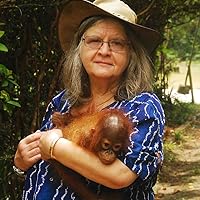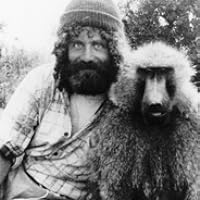Primates Quotes
Quotes tagged as "primates"
Showing 1-30 of 41

“If we look straight and deep into a chimpanzee's eyes, an intelligent self-assured personality looks back at us. If they are animals, what must we be?”
―
―
“Much of human behavior can be explained by watching the wild beasts around us. They are constantly teaching us things about ourselves and the way of the universe, but most people are too blind to watch and listen.”
― Rise Up and Salute the Sun: The Writings of Suzy Kassem
― Rise Up and Salute the Sun: The Writings of Suzy Kassem

“One of the great commandments of science is, 'Mistrust arguments from authority'. (Scientists, being primates, and thus given to dominance hierarchies, of course do not always follow this commandment.)”
― The Demon-Haunted World: Science as a Candle in the Dark
― The Demon-Haunted World: Science as a Candle in the Dark

“As I sit, my back leaning against a damp, moss-covered tree trunk, my eyes sweeping the canopy above, my ears straining to catch the crack of a distant branch that betrays an orangutan moving in the treetops, I think about how we humans search for God. The tropical rain forest is the most complex thing an ordinary human can experience on this planet. A walk in the rain forest is a walk into the mind of God.”
― Reflections of Eden: My Years with the Orangutans of Borneo
― Reflections of Eden: My Years with the Orangutans of Borneo

“I’d been traveling in Asia long enough to know that monkeys there are nothing like their trombone-playing, tambourine-banging cousins I’d seen on TV as a kid.
Free-living Asian primates possess a characteristic I found shocking and confusing the first time I saw it: self-respect. If you make the mistake of holding the gaze of a street monkey in India, Nepal, or Malaysia, you’ll find you’re facing a belligerently intelligent creature whose expression says, with a Robert DeNiro–like scowl, “What the hell are you looking at? You wanna piece of me?”
Forget about putting one of these guys in a little red vest.”
― Sex at Dawn: The Prehistoric Origins of Modern Sexuality
Free-living Asian primates possess a characteristic I found shocking and confusing the first time I saw it: self-respect. If you make the mistake of holding the gaze of a street monkey in India, Nepal, or Malaysia, you’ll find you’re facing a belligerently intelligent creature whose expression says, with a Robert DeNiro–like scowl, “What the hell are you looking at? You wanna piece of me?”
Forget about putting one of these guys in a little red vest.”
― Sex at Dawn: The Prehistoric Origins of Modern Sexuality

“Humans diverged from apes about as long ago as African and Asian elephants did from each other, and they are genetically as close or distant. Yet we freely call both of those species “elephants” while obsessing over the specific point at which our own lineage moved from being an ape to being human. We even have special words for this process, such as humanization and anthropogenesis. That there was ever a point in time is a widespread illusion, like trying to find the precise wavelength in the light spectrum at which orange turns red. Our desire for sharp divisions is at odds with evolution’s habit of making extremely smooth transitions.”
― Mama's Last Hug: Animal Emotions and What They Tell Us about Ourselves
― Mama's Last Hug: Animal Emotions and What They Tell Us about Ourselves

“If you now ask me if there is any difference between the human sense of fairness and that of chimpanzees, I really don’t know anymore. There are probably a few differences left, but by and large both species actively seek to equalize outcomes. The great step up compared with the first-order fairness of monkeys, dogs, crows, parrots, and a few other species is that we hominids are better at predicting the future. Humans and apes realize that keeping everything for themselves will create bad feelings. So second-order fairness can be explained from a purely utilitarian perspective. We are fair not because we love each other or are so nice but because we need to keep cooperation flowing. It’s our way of retaining everyone on the team.”
― Mama's Last Hug: Animal Emotions and What They Tell Us about Ourselves
― Mama's Last Hug: Animal Emotions and What They Tell Us about Ourselves

“Female humans are the only primates with permanently enlarged buttocks. Enlarged female breasts evolved as a copy of the female posterior.”
― 666: Connection with Crowley
― 666: Connection with Crowley

“Anyone who says that our worst behaviors are inevitable knows too little about primates, including us.”
― Behave: The Biology of Humans at Our Best and Worst
― Behave: The Biology of Humans at Our Best and Worst

“Poaching of one kind or another is, of course, the single most serious threat to the survival of the mountain gorillas, but it's hard not to wonder whether declaring open season on human beings is the best plan for solving the problem. We are not an endangered species ourselves yet, but this is not for lack of trying.”
― Last Chance to See
― Last Chance to See

“Many humans would experiment on nonhumans in the hope of saving a loved one, and they would just as readily experiment on humans to sustain that same hope.”
― Primate People: Saving Nonhuman Primates through Education, Advocacy, and Sanctuary
― Primate People: Saving Nonhuman Primates through Education, Advocacy, and Sanctuary

“We are morally required to stop systematically exploiting others, whether chimpanzees or pygmy lemurs, chickens or chinchillas. Nonhuman animals are also persons who fare better or worse depending on the way we treat them, we must begin to give them the respect and dignity that persons deserve”
― Primate People: Saving Nonhuman Primates through Education, Advocacy, and Sanctuary
― Primate People: Saving Nonhuman Primates through Education, Advocacy, and Sanctuary

“Nonhuman primates have been crowded out of diminishing forests, hunted for food or “medicine,” kidnapped for the lucrative pet/tourist trade, and bred for science. As a result, every primate species on the planet—aside from human beings—is either endangered or threatened.”
― Primate People: Saving Nonhuman Primates through Education, Advocacy, and Sanctuary
― Primate People: Saving Nonhuman Primates through Education, Advocacy, and Sanctuary

“Scientists treat animals like petri dishes—recording emotional distress and physiological terror like weather fluctuations on a barometer.”
― Primate People: Saving Nonhuman Primates through Education, Advocacy, and Sanctuary
― Primate People: Saving Nonhuman Primates through Education, Advocacy, and Sanctuary

“Might does not make right; self-interest—even desperate self-interest—does not justify exploiting others.”
― Primate People: Saving Nonhuman Primates through Education, Advocacy, and Sanctuary
― Primate People: Saving Nonhuman Primates through Education, Advocacy, and Sanctuary

“International trade in primates flourishes because we exploit primates for science.”
― Primate People: Saving Nonhuman Primates through Education, Advocacy, and Sanctuary
― Primate People: Saving Nonhuman Primates through Education, Advocacy, and Sanctuary

“What megalomania led us to believe it would be morally acceptable to exploit individuals from other species for scientific experimentation?”
― Primate People: Saving Nonhuman Primates through Education, Advocacy, and Sanctuary
― Primate People: Saving Nonhuman Primates through Education, Advocacy, and Sanctuary

“Increasingly we come to understand that any difference between human and nonhuman primates does not necessarily show humans in a complimentary light.”
― Primate People: Saving Nonhuman Primates through Education, Advocacy, and Sanctuary
― Primate People: Saving Nonhuman Primates through Education, Advocacy, and Sanctuary

“If we are going to save endangered primates, we must first recognize that they are individuals much like human beings, who prefer to be free to live their lives independent of exploitation.”
― Primate People: Saving Nonhuman Primates through Education, Advocacy, and Sanctuary
― Primate People: Saving Nonhuman Primates through Education, Advocacy, and Sanctuary

“Nonhuman primates are many and wondrous, yet few and endangered.”
― Primate People: Saving Nonhuman Primates through Education, Advocacy, and Sanctuary
― Primate People: Saving Nonhuman Primates through Education, Advocacy, and Sanctuary

“The lives of anymals matter not just to us—not just in light of our selfish interest in diversity—but to them.”
― Primate People: Saving Nonhuman Primates through Education, Advocacy, and Sanctuary
― Primate People: Saving Nonhuman Primates through Education, Advocacy, and Sanctuary

“Our efforts to protect primates will be much more effective if we dismantle the artificial line that we have created between ourselves and other animals.”
― Primate People: Saving Nonhuman Primates through Education, Advocacy, and Sanctuary
― Primate People: Saving Nonhuman Primates through Education, Advocacy, and Sanctuary

“Pertenecemos al orden Primates (en latín -los primeros-). En 1758 el naturalista sueco Carl Linneo bautizó con ese nombre a todas las especies de mamíferos semejantes a nosotros, siguiendo la tradición antropocéntrica todavía imperante en su tiempo.”
― Orígenes: El universo, la vida, los humanos (Drakontos)
― Orígenes: El universo, la vida, los humanos (Drakontos)

“Apes do evidently understand what others are doing, and they can prudently do the same, in which sense they "cooperate"—for their own reasons. But they lack the ability to symbolically participate in others' existence and thus communalize their own. [...]
"Traditional models of economic decision-making assume that people are self-interested rational maximizers. Empirical research has demonstrated, however, that people will take into account the interest of others and are sensitive to norms of cooperation and fairness. [...] Here we show that in an ultimatum game, humans' closest living relatives, chimpanzees (Pan troglodytes), are rational maximizers and are not sensitive to fairness. These results support the hypothesis that other-regarding preferences and aversion to inequitable outcomes, which play key roles in human social organization, distinguish us from our closest living relatives." {Jensen, Call, and To masello 2007, 107; see also Jensen et al. 2006)
So much, then, for the dismal economic science—whose future is not bright either, inasmuch as chimpanzees are disappearing.”
― What Kinship Is-And Is Not
"Traditional models of economic decision-making assume that people are self-interested rational maximizers. Empirical research has demonstrated, however, that people will take into account the interest of others and are sensitive to norms of cooperation and fairness. [...] Here we show that in an ultimatum game, humans' closest living relatives, chimpanzees (Pan troglodytes), are rational maximizers and are not sensitive to fairness. These results support the hypothesis that other-regarding preferences and aversion to inequitable outcomes, which play key roles in human social organization, distinguish us from our closest living relatives." {Jensen, Call, and To masello 2007, 107; see also Jensen et al. 2006)
So much, then, for the dismal economic science—whose future is not bright either, inasmuch as chimpanzees are disappearing.”
― What Kinship Is-And Is Not

“For men, as Kissinger once said, power is the ultimate aphrodisiac. They jealously guard it, and if anyone challenges them, they lose all inhibitions. The same occurs in chimps. The first time I saw an established leader lose face, the noise and passion of his reaction astonished me. Normally a dignified character, this alpha male became unrecognizable when confronted by a challenger who slapped his back during a passing charge and slung huge rocks in his direction. The challenger barely stepped out of the way when the alpha countercharged. What to do now? In the midst of such a confrontation, the alpha would drop out of a tree like a rotten apple, writhe on the ground, scream pitifully, and wait to be comforted by the rest of the group. He acted much like a juvenile ape being pushed away from his mother’s breast. And like a juvenile, who during a noisy tantrum keeps an eye on Mom for signs of softening, the alpha took note of who approached him. When the group around him was big enough, he instantly regained courage. With his supporters in tow, he rekindled the confrontation with his rival.
Once he lost his top spot, this alpha male sat staring into the distance after every brawl, unaccustomed to losing them. He’d have an empty expression on his face, oblivious to the social activity around him. He refused food for weeks. He became a mere ghost of the impressive big shot he had been. For this beaten and dejected alpha male, it was as if the lights had gone out.”
― Mama's Last Hug: Animal Emotions and What They Tell Us about Ourselves
Once he lost his top spot, this alpha male sat staring into the distance after every brawl, unaccustomed to losing them. He’d have an empty expression on his face, oblivious to the social activity around him. He refused food for weeks. He became a mere ghost of the impressive big shot he had been. For this beaten and dejected alpha male, it was as if the lights had gone out.”
― Mama's Last Hug: Animal Emotions and What They Tell Us about Ourselves

“While bonobos are very peaceful and pretty happy, they’re also very gross. As a society. They engage in incest. And not just cousins or brothers and sisters. Absolutely anything goes, including parents with their children, with the exception sometimes of mother and adult son. The most heinous of human crimes is normal for them. And none of them ever settle down. They don’t ever practice monogamy. It isn’t a phase, it’s just how sex works in their society.”
―
―

“Every morning, the male and female [Siamang] burst into spectacular duets. [...] Since the song reflects their marriage, the more beautiful it is, the more their neighbors realize not to mess with them. A close-harmony duet communicates not only "stay out!" but also "we're one!" (p. 177)”
― Are We Smart Enough to Know How Smart Animals Are?
― Are We Smart Enough to Know How Smart Animals Are?

“Rather than expend energy on an obvious ploy, a chimpanzee can give social clues so subtle that Agatha Christie would be envious.”
― The Wisdom of Loki: The Art of Lying in the Natural World
― The Wisdom of Loki: The Art of Lying in the Natural World
All Quotes
|
My Quotes
|
Add A Quote
Browse By Tag
- Love Quotes 97.5k
- Life Quotes 76k
- Inspirational Quotes 73k
- Humor Quotes 43.5k
- Philosophy Quotes 29.5k
- Inspirational Quotes Quotes 27k
- God Quotes 26k
- Truth Quotes 23.5k
- Wisdom Quotes 23.5k
- Romance Quotes 23k
- Poetry Quotes 22k
- Death Quotes 20k
- Happiness Quotes 18.5k
- Life Lessons Quotes 18.5k
- Hope Quotes 18k
- Faith Quotes 18k
- Quotes Quotes 16.5k
- Inspiration Quotes 16.5k
- Spirituality Quotes 15k
- Religion Quotes 15k
- Motivational Quotes 15k
- Writing Quotes 15k
- Relationships Quotes 14.5k
- Life Quotes Quotes 14k
- Love Quotes Quotes 14k
- Success Quotes 13.5k
- Time Quotes 12.5k
- Motivation Quotes 12k
- Science Quotes 11.5k
- Motivational Quotes Quotes 11.5k


